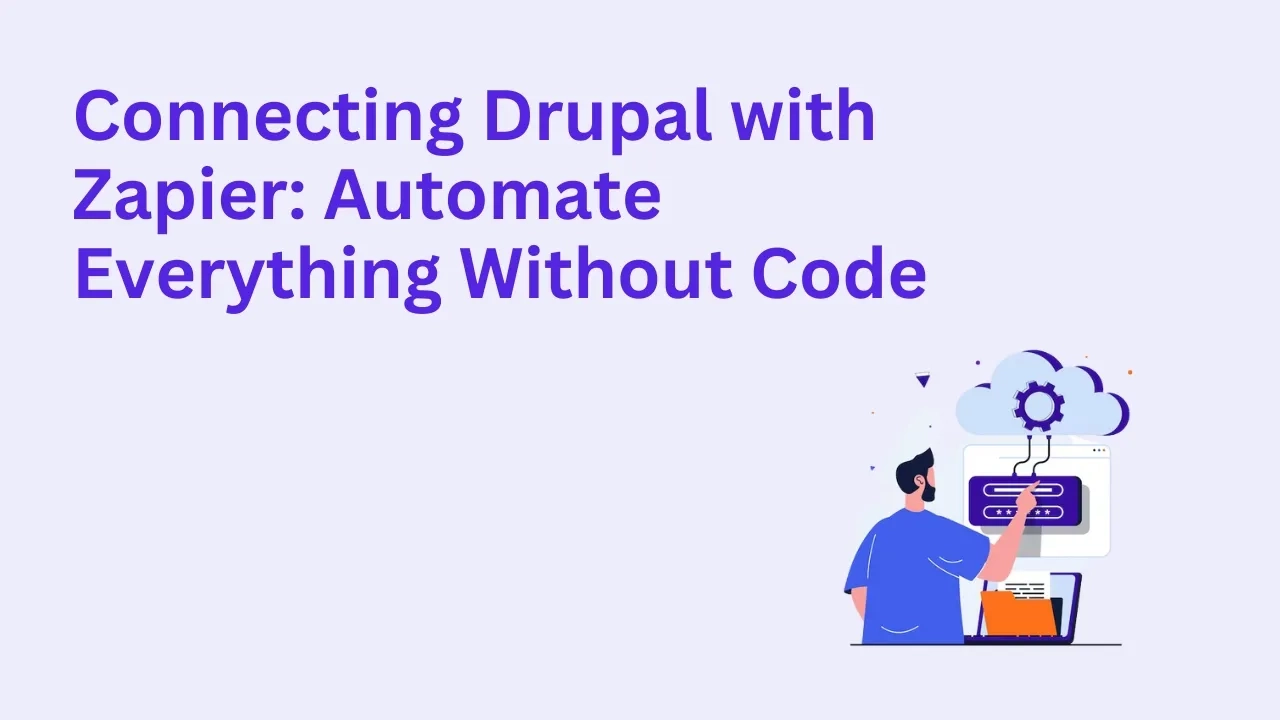How To Connect Drupal with Zapier: Automate Everything Without Code

In today’s fast-paced digital ecosystem, automation isn’t a luxury — it’s a necessity. Whether you're managing leads, content publishing, or notifications, repetitive tasks eat up valuable time. The good news? You can automate workflows between Drupal and thousands of other apps using Zapier, without writing a single line of code.
In this blog, we’ll show you how to connect Drupal with Zapier and streamline your business operations through no-code automation.
Why Automate Drupal Workflows?
Manually copying data between Drupal and tools like Slack, Gmail, Google Sheets, or Mailchimp slows your team down. Zapier solves that by creating “Zaps” — automated workflows that connect Drupal with over 6,000+ apps.
Benefits of using Zapier with Drupal:
Automate lead capture and follow-ups
Sync content updates with social media platforms
Notify team members instantly on changes
Push form data to CRMs or Google Sheets
Reduce human error and improve response time
What You’ll Need to Get Started
To connect Drupal with Zapier, you’ll need:
A working Drupal 9 or 10 site
Installed and configured Drupal Webform or JSON:API module
A Zapier account (free or paid, depending on usage)
A Zapier-compatible trigger or endpoint on Drupal
Methods to Connect Drupal with Zapier
There’s no official Drupal-Zapier module, but you can use these approaches:
1. Webhook Integration via Webform or Custom Events
Drupal can send data to Zapier via Webhooks, which Zapier can receive as a trigger.
How to do it:
Install the Webform module
Add a Webform on your Drupal site (e.g., Contact Us, Newsletter Signup)
In the Webform settings, enable Remote Post or use the Webform Webhooks module
Paste your Zapier Webhook URL (generated by Zapier trigger)
Zapier will receive form submissions and push them to any app you choose — like Slack, Gmail, or Google Sheets.
2. Using JSON:API as a Zapier Action Source
If you want to pull data from Drupal, you can use Drupal’s JSON:API module:
Enable JSON:API and expose content types like "Blog" or "Product"
Use Zapier Webhooks → GET to fetch data from Drupal
Apply filters (e.g., “only fetch new blog posts”)
Send the data to platforms like Twitter, LinkedIn, or Notion
Perfect for automating content syndication or analytics tracking.
3. Push Content Updates via Zapier Actions
Want to create a reverse Zap — where Zapier sends data to Drupal?
Use Zapier Webhooks → POST to Drupal’s REST or JSON:API endpoint
Authenticate using basic auth or OAuth
Map incoming data (e.g., from Airtable or Typeform) into a Drupal node or custom entity
This allows automatic content publishing, user creation, or triggering workflows inside Drupal.
Common Use Cases to Try
Here are some powerful automation ideas using Drupal and Zapier:
Send new form submissions to Slack or Microsoft Teams
Add subscribers from a Drupal form to Mailchimp
Push new articles to Buffer or Hootsuite for scheduling
Sync user signups to a Google Sheet for your sales team
Trigger Zendesk or HubSpot tickets from support forms
Security Tips
Always use secure HTTPS endpoints
Add authentication to your Drupal APIs
Use CAPTCHA on public Webforms to prevent spam
Limit webhook exposure and use rate-limiting where possible
Log all Zapier interactions for audit trails
No-Code, High Impact: Drupal + Zapier in Action
By connecting Drupal with Zapier, you can eliminate bottlenecks and give your team more time to focus on what matters — strategy, creativity, and customer engagement.
Whether you’re running a content-heavy site, managing user data, or handling client intake forms, automation with Zapier gives your Drupal site new superpowers.
Final Thoughts
You don’t need to be a developer to automate your business workflows. With Drupal’s API capabilities and Zapier’s intuitive interface, you can integrate thousands of apps with just a few clicks.
From lead generation to publishing, Zapier makes Drupal smarter — and your team faster.
Need Help Automating Your Drupal Workflows?
At Drupalify, we help businesses automate their operations by integrating Drupal with tools like Zapier, CRMs, email marketing platforms, and more.
🔗 Custom API & webhook setup
⚙️ Webform automation
📈 Marketing & lead tracking
🧠 Scalable no-code integrations








